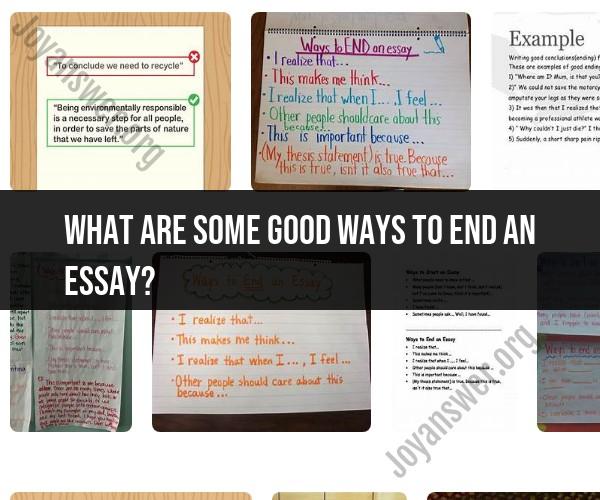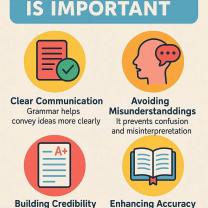What are some good ways to end an essay?
A strong conclusion is essential to leave a lasting impression on your readers and wrap up your essay effectively. Here are some effective ways to conclude an essay:
Summarize Your Main Points:
- Summarize the key points and arguments you've made throughout the essay. This reinforces the main ideas and helps readers recall the central message.
Restate Your Thesis Statement:
- Restate your thesis statement or main argument in a concise and slightly different way. This reaffirms the purpose of your essay and ties the conclusion to the introduction.
Provide a Thought-Provoking Quote:
- Include a relevant and thought-provoking quote from a reputable source or a famous figure that relates to your essay's theme. Ensure it connects with your essay's content and leaves readers with something to ponder.
Pose a Question:
- Ask a rhetorical question related to your topic or thesis. This encourages readers to think critically about the subject and engages them in reflection.
Offer a Call to Action:
- If your essay is persuasive or argumentative, conclude with a call to action. Encourage your readers to take a specific step or consider a particular course of action based on your essay's message.
Provide a Solution or Recommendation:
- If your essay addresses a problem or issue, offer a potential solution or recommendation in the conclusion. This can leave readers with a sense of hope or a clear path forward.
Zoom Out to a Broader Context:
- Broaden the discussion by connecting your essay's topic to a larger context, such as society, history, or the world at large. Show the significance of your essay's ideas in a broader context.
End with a Personal Anecdote or Story:
- Share a brief personal anecdote or story that relates to your essay's theme. This can create an emotional connection with your readers and provide a memorable conclusion.
Link to the Introduction:
- Link your conclusion back to the introduction by referring to an idea, concept, or metaphor introduced at the beginning. This creates a sense of closure and cohesion.
Consider the Tone:
- Maintain a tone that aligns with the rest of your essay. If your essay is serious and academic, the conclusion should reflect that. If it's more personal or reflective, your conclusion can have a corresponding tone.
Avoid Introducing New Information:
- Your conclusion is not the place to introduce new evidence or arguments. It should recapitulate existing points and provide closure.
Keep It Concise:
- While your conclusion should be comprehensive, it should also be concise. Avoid unnecessary repetition or elaboration.
Proofread and Revise:
- Carefully proofread and revise your conclusion for clarity and coherence. A well-crafted conclusion reflects positively on the overall quality of your essay.
Remember that the conclusion is your final opportunity to leave a strong impression and reinforce your essay's message. Tailor your conclusion to your specific essay and audience, and aim to create a sense of satisfaction and closure for your readers.
The three titles you have provided highlight the importance of writing a strong essay conclusion. The conclusion is your last chance to leave a lasting impression on your reader and to reinforce the main points of your essay. By following some simple strategies, you can write a conclusion that is both effective and memorable.
Strategies for a Strong Essay Conclusion: How to End Your Essay Effectively
This title emphasizes the importance of using a variety of strategies to write a strong essay conclusion. Some common strategies include:
- Summarizing your main points: This is a good way to remind your reader of the key takeaways from your essay.
- Restating your thesis statement: This helps to reinforce your main argument and to leave your reader with a clear understanding of your position.
- Asking a question: This can be a good way to engage your reader and to encourage them to think more deeply about your topic.
- Making a call to action: This can be a good way to motivate your reader to take a specific action, such as learning more about your topic or taking a stand on an issue.
The Art of Essay Endings: Techniques for Leaving a Lasting Impression
This title highlights the importance of using creative techniques to leave a lasting impression on your reader. Some common techniques include:
- Using a vivid image or metaphor: This can help to capture your reader's attention and to make your conclusion more memorable.
- Telling a story or anecdote: This can be a good way to connect with your reader on an emotional level and to make your conclusion more personal.
- Using a quote: This can be a good way to add authority to your argument or to express your ideas in a unique and memorable way.
Summarizing and Closing: Making the Most of Your Essay's Conclusion
This title emphasizes the importance of using the conclusion to summarize your main points and to close your essay effectively. Here are some tips for writing a strong conclusion:
- Make sure your conclusion is relevant to the rest of your essay. Avoid introducing new information or arguments in your conclusion.
- Conclude with a strong statement. This could be a restatement of your thesis statement, a call to action, or a thought-provoking question.
- Proofread your conclusion carefully. Make sure there are no errors in grammar or spelling.
By following these tips, you can write a conclusion that is both effective and memorable. A strong conclusion can help you to leave a lasting impression on your reader and to reinforce the main points of your essay.













